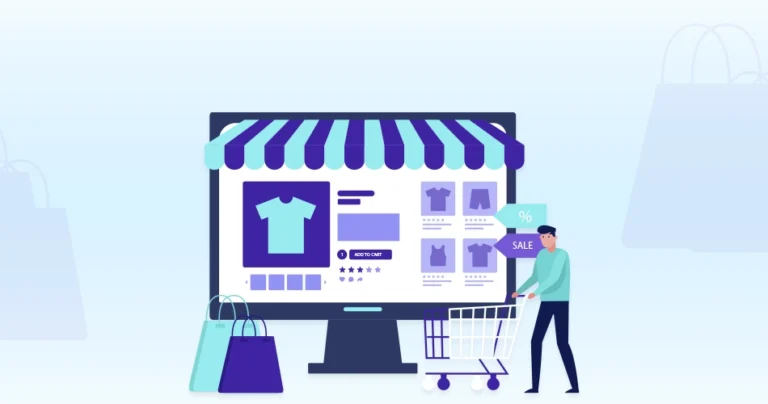Nowadays, even the smaller businesses need a strong online presence, and eCommerce websites can help that. You can showcase your products or services to a vast audience 24/7, breaking geographical limitations and opening doors to new customers.
Creating an eCommerce website for a small business involves from user-friendly design and intuitive navigation to secure payment gateways and data management. The business needs to identify the features that best suit your specific needs and budget.
So, how do you create the best eCommerce website for a small business? Well, the professional eCommerce development services focus on a few key elements to ensure the best user experience, functionalities, and of course, higher sales.
Let’s begin this blog by discussing the need for eCommerce websites among the smaller businesses.
Why are eCommerce Websites Important for Small Businesses?
In the ever-growing digital landscape, an eCommerce website acts as a game-changer for small businesses.
- Reach a Global Audience: An eCommerce website allows you to showcase your products and services to a vast customer base, transcending local borders. This opens doors to a wider market, increasing your potential for sales and brand recognition.
- 24/7 Availability: Unlike a physical store, an eCommerce website is open 24X7. So customers can browse your products, compare options, and make purchases at their convenience, day or night. This means better customer satisfaction and higher sales.
- Reduced Operational Costs: Setting up and running a physical store can be expensive, with rent, utilities, and staff salaries eating into your profits. An eCommerce website eliminates many of these overhead costs, meaning a leaner budget.
- Data-driven Decisions: With an eCommerce platform, you gain valuable customer data and insights into purchasing behavior. So you can track sales trends, identify popular products, and understand your target audience better. It helps you make more informed decisions about the marketing strategies and product offerings.
- Enhanced Customer Experience: With an eCommerce website, you can create a personalized shopping experience for your customers. Integrate features like detailed product descriptions, high-quality images, and easy-to-use navigation. That makes it a breeze for the customers to find what they need and complete purchases seamlessly.
So it’s evident that starting an eCommerce website can help a small business compete on a larger scale. They can reach new customers and achieve long-term growth.
As we mentioned, eCommerce services consider a range of key elements to create a small business eStore. Let’s look at these elements.
What to Include in eCommerce Websites for Small Businesses?
When trying to create a successful eCommerce website for a small business, you need to consider a few key elements. They will ensure good user experience, advanced functionalities, and better eCommerce sales. These elements include:
User-friendly Design and Navigation
Your website should be visually appealing and easy to navigate. Imagine your online store. Customers should be able to find what they’re looking for intuitively, just like browsing the aisles of a physical shop. A clean, uncluttered design with clear menus and intuitive search functionality is key.
High-quality Product Images and Descriptions
High-resolution product images showcasing your offerings from multiple angles are essential. Complement these with detailed, informative descriptions that highlight features, benefits, and specifications. Don’t forget to optimize your product descriptions with relevant keywords to improve search engine ranking.
Secure Payment Gateway
Customers need to feel confident when making purchases online. Ensure your website uses a secure payment gateway that encrypts sensitive information and protects against fraud. Popular options include PayPal, Stripe, and Authorize.net.
Streamlined Checkout Process
A long and complicated checkout process can lead to cart abandonment. Strive for a streamlined checkout that requires minimal steps and offers guest checkout options for faster transactions.
Mobile-responsive Design
With the rise of mobile shopping, a website that adapts seamlessly to different screen sizes is crucial. A mobile-responsive design ensures a smooth user experience on smartphones and tablets, capturing the ever-growing mobile market.
Customer Reviews and Ratings
Social proof is very important. Customer reviews and ratings build trust and encourage potential buyers to make purchases. Integrate a system for customers to leave feedback and showcase positive reviews prominently. And you can use the customer feedback for better results.
Clear Return and Refund Policy
A transparent return and refund policy builds customer confidence. Outline your policy clearly on your website, making it easy for customers to find and understand.
Multiple Shipping Options
Offer a variety of shipping options to cater to different customer needs and budgets. Consider providing standard, expedited, and free shipping options based on order value. Also integrate a shipping management software to make the process more seamless.
SEO Optimization
Optimize your eCommerce website for search engines so the potential customers can find your site and products more easily. Use relevant keywords throughout your product descriptions, titles, and meta tags. Also, do regular eCommerce SEO audits for constant improvements.
Social Media Integration
Leverage the power of social media to promote your products and drive traffic to your website. Integrate social media into your eCommerce website for easy sharing and connect your online store with your social media profiles.
These elements will help ensure a user-friendly, secure, and conversion-driven eCommerce website propelled towards success. But which platforms would be suitable for that?
Top eCommerce Development Platforms for Small Businesses
Now that you understand the importance of eCommerce websites for small businesses along with the key elements, let’s see the top platforms for it.
Shopify
Shopify is a leading all-in-one eCommerce platform known for its user-friendly interface and extensive range of features. With Shopify, you can set up your online store quickly and easily, even with no prior coding experience.
They offer a variety of themes and apps to customize your store’s look and functionality, and their built-in payment gateway simplifies the transaction process.
Best for: Businesses with limited technical experience and looking for a scalable platform that can grow with them.
WooCommerce
WooCommerce is a popular open-source eCommerce plugin for WordPress websites. It offers a high degree of flexibility and customization, allowing you to tailor your online store to your exact needs. Since it’s built on WordPress, you benefit from a vast ecosystem of themes and plugins to enhance your store’s functionality. However, WooCommerce requires some technical knowledge to set up and maintain.
Best for: Businesses with some technical knowledge or those who use WordPress for their website, businesses looking for a highly customizable platform.
Wix
Similar to Squarespace, Wix is a website builder that has expanded into eCommerce functionality. Their drag-and-drop interface makes it easy to create a user-friendly online store, and they offer a variety of apps to extend your store’s capabilities. However, Wix can be limiting in terms of customization and scalability for complex businesses.
Best for: Businesses with limited technical knowledge who prioritize ease of use, need a website builder in addition to an eCommerce platform.
BigCommerce
BigCommerce is a robust eCommerce platform designed for businesses with high-volume sales. It offers powerful features for managing inventory, marketing, and SEO, making it a good choice for businesses looking to scale. However, BigCommerce has a steeper learning curve compared to some other options on this list.
Best for: Businesses with a large product catalog or those expecting high sales volume, businesses that need advanced features and functionalities.
Squarespace
Squarespace is a website builder known for its beautiful templates and drag-and-drop interface. While not strictly an eCommerce platform, Squarespace offers robust eCommerce features that allow you to create a visually appealing online store. It’s perfect for small businesses selling a limited number of products who prioritize a user-friendly experience.
Best for: Businesses that prioritize design aesthetics, businesses that also need a website builder in addition to an eCommerce platform.
Choosing the right eCommerce platform depends on your specific needs and technical expertise. Consider factors like your budget, the number of products you sell, the level of customization you require, and your technical comfort level before making a decision.
You can also opt for our eCommerce consulting services to get a better idea on the best platform and create the best eStore.
Conclusion
With an eCommerce website, a small business can serve a vast global audience and propel your business towards growth and success. The key elements to consider in a small business eCommerce website go from user-friendly design and intuitive navigation to secure payment gateways and data management.
Remember, the best eCommerce platform depends on your unique business goals and technical expertise. Whether you’re a tech whiz or a complete beginner, there’s a platform out there that can empower you to create a powerful online store.
So, need help with your eCommerce business website? Our eCommerce website packages are tailored to provide small businesses with all the tools and features needed to create a professional and fully functional online store. Consult with our experts today to get started!
FAQs on Best eCommerce Website for Small Business
Q1. Are there any other options for small businesses besides Shopify, WooCommerce, and BigCommerce?
Yes, there are many other options for small businesses, such as Squarespace, Wix, and Weebly. These platforms also offer ecommerce capabilities and may be a better fit for your specific business needs.
Q2. Can I create a custom ecommerce website for my small business?
Yes, you can create a custom ecommerce website for your small business by hiring a web developer or using a website builder with customizable options. This may be a more expensive option but can provide a unique and tailored website for your business.
Q3. I'm not very tech-savvy. Can I still build an eCommerce website?
Many eCommerce platforms are designed with the non-technical user in mind. Platforms like Shopify and Squarespace offer user-friendly interfaces and drag-and-drop functionality that allows you to build your store without needing to write any code.

